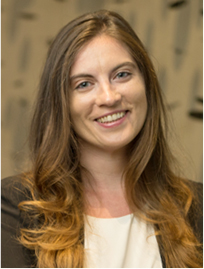Junior Faculty Spotlight: Sara Mayeux
Each month, the CFT Newsletter highlights the work of our Junior Faculty Teaching Fellows. This month, Sara Mayeux, Law, talks about her teaching philosophy and interests.

Sara Mayeux
I teach Constitutional Law II, which is a large, upper-level law school course focused primarily on the Fourteenth Amendment, including equal protection and due process, and individual rights. We cover a range of topics in constitutional law as it relates to racial discrimination, sex/gender/sexual orientation discrimination, affirmative action, the right to privacy, abortion, and other hot-button issues. I also teach a small seminar on legal history, and this year will begin teaching another upper-level constitutional law course focused on the First Amendment.
What’s exciting about teaching constitutional law is that students come to class with a lot of engagement and interest in the material. Almost all of the cases we read and discuss are high-profile Supreme Court decisions—the kinds of cases that students might have pictured learning about when they first dreamed of coming to law school. Even if they do not become constitutional litigators, students want to understand these legal issues in their capacity as citizens and future leaders of their communities.
The challenge of teaching constitutional law, however, is that it often doesn’t seem very “law-like” to students. With each Supreme Court term, the doctrine is always changing, and there are fierce debates both within the Court and within society generally about how the Constitution is supposed to be interpreted and applied. As a result, this is an area of the law that can seem very fuzzy to students, especially in comparison to areas of the law governed by statutes and regulations (although, of course, one thing students hopefully take away from law school is that even those areas of the law that seem to have clear rules are almost always fuzzier than they first appear). What I hope to help students see is that constitutional law does have its own rules, standards, parameters, and repertoires of arguments, and making constitutional arguments is a skill that they can master with practice.
One thing that seems to help to make constitutional law more concrete is to provide examples of how lawyers marshal constitutional arguments in practice, in the more routine types of local cases that do not make national headlines and will likely never make it to the Supreme Court. In class, I try to incorporate discussion problems based on recent or pending cases in the lower courts so students can see how lawyers and judges grapple with applying the Supreme Court’s guidance to new scenarios and gain practice in doing this themselves.
Law school teaching is currently undergoing significant transition nationwide, as the American Bar Association has recently adopted a new accreditation standard requiring law schools to incorporate “both formative and summative assessment methods” into the curriculum. For decades, law school courses have primarily been taught in the traditional “Socratic” format, in which the professor cold-calls students to answer questions about the reading. In a traditional law school course, students complete few if any written assignments other than the final exam, which may constitute their entire grade for the course, and thus receive little feedback along the way about whether they are mastering the material. There are certainly benefits to Socratic teaching, such as giving future lawyers practice in oral advocacy and thinking on the spot. Overall, though, it would be hard to defend an exclusive reliance on the traditional approach—and especially the lack of formative feedback—in light of what we now know about pedagogy and cognitive psychology.
Law professors are increasingly experimenting with alternative or complementary approaches including small group work, more frequent quizzes rather than simply a final exam, writing assignments that mimic scenarios lawyers might encounter in practice, responsive technology, in-class problem-solving exercises, etc. Through the Teaching Fellows program, I hope to deepen my understanding of these different approaches and what works best for teaching in a law school setting.

Leave a Response